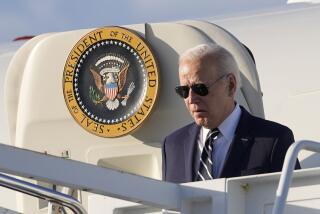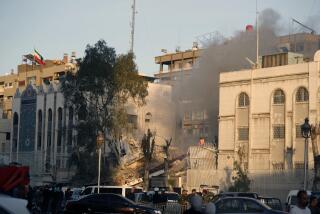Bush’s parting shots at Syria
Just a little more than a week before the presidential election, the United States on Sunday began a dramatic escalation of the conflicts in the Middle East, launching what is believed to be the first attack on Syrian soil by U.S. troops. Although both the outcome and the purpose of this raid remain vague, what’s certain is that the next president is going to pay a heavy diplomatic price for it.
Washington is tight-lipped, but officials have confirmed that special operations forces entered Syria to target the head of a cell that has been sending foreign fighters into Iraq. Syrian media claim that four U.S. helicopters crossed the border and landed troops on a farm, where eight people, including four children, were killed.
The raid is notable not just because it seems to open a new front in the war on terror but because of its strange timing. For one thing, it comes when Syria has been showing unusual cooperation and willingness to negotiate with the West. Two weeks ago, Syrian President Bashar Assad ordered his government to establish full diplomatic relations with Lebanon, the first step in repairing decades of troubled ties between the two countries. This month, the former U.S. commander in Iraq, Army Gen. David H. Petraeus, praised Syria’s cooperation in policing its borders to stop foreign fighters from crossing over, and last month Syria and Washington seemed to be nearing a thaw in their chilly relations when Secretary of State Condoleezza Rice met with Foreign Minister Walid Moallem. That’s over now; on Monday, Moallem called the U.S. attack an act of “criminal and terrorist aggression.”
The raid also comes during extremely sensitive negotiations on a security agreement in Iraq. Opponents of the deal, which calls for U.S. troops to leave the country in 2011, argue that if it’s signed, Iraq would be used as a staging ground for the U.S. to launch attacks on neighboring countries, such as Iran and Syria. Sunday’s incursion will doubtless complicate efforts to produce a new agreement before the current one expires Dec. 31.
Finally, there’s the issue of the presidential election. Some pundits have suggested that the attack is a parting shot from President Bush, his last attempt to exact vengeance on a longtime rival before leaving office. That’s a bit cynical even for Bush critics, including this page, but it’s notable that in the closing months of the administration, the military has grown considerably more aggressive in pursuing foreign insurgents -- especially in Pakistan, where U.S. attacks across the Afghanistan border have become almost commonplace. Bush, it appears, is conducting yet another experiment in Middle Eastern cowboy diplomacy, with the advantage (for him) that if it all blows up, someone else will have to pick up the pieces.
More to Read
A cure for the common opinion
Get thought-provoking perspectives with our weekly newsletter.
You may occasionally receive promotional content from the Los Angeles Times.






